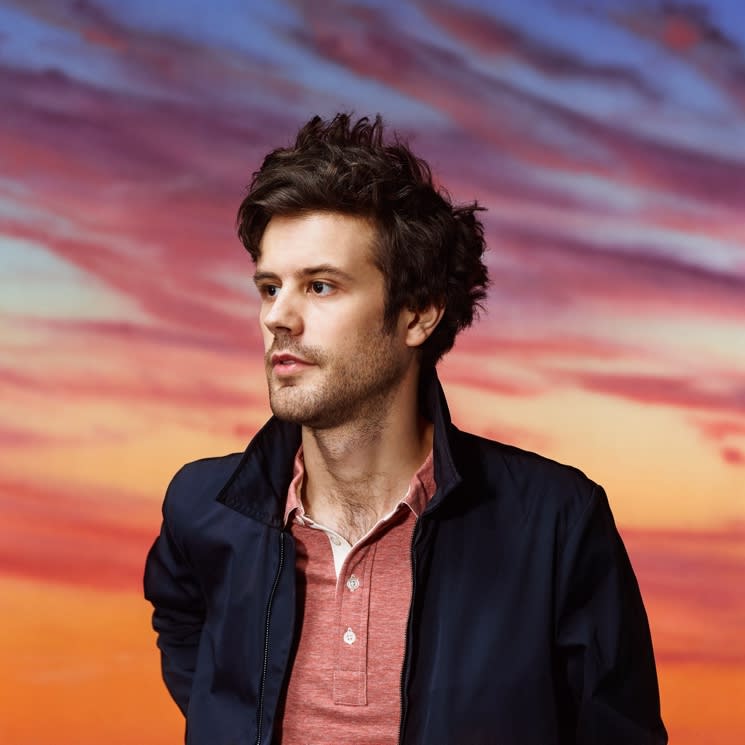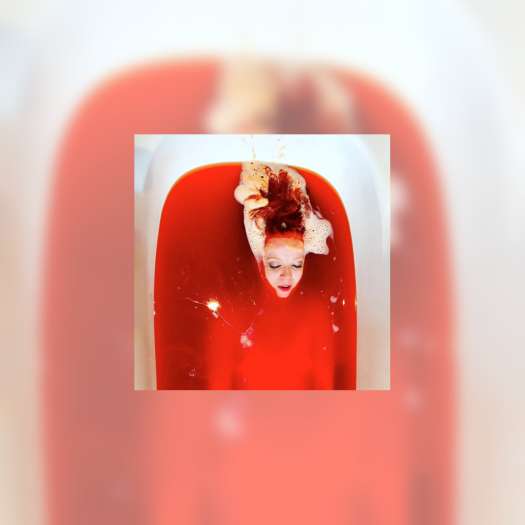In a string of tweets yesterday (July 23), Angelakos continued to open up the dialogue about his own experiences with mental illness, encouraging others to end the stigma — an issue he describes as "the last universal human rights issue."
He goes on to explain the complicated nuances of treating and living with bipolar disorder, and declares: "Until it is safer and healthier for us to be advocates, to be a writers, producers, and performers, I simply cannot continue making music."
He outlines the contradictions he's faced between raising awareness and promoting his own musical ambitions, claiming that he'd often ignore his instincts "when something would be wrong" and "almost die." As such, he's decided to commit his full-time focus to improving "systems and their flaws" with regards to professional creative environments.
Earlier this year, Angelakos launched an artist support network dubbed the Wishart Group, which has raised $250 million in funding to provide legal, educational and healthcare (with an emphasis on mental health) services to artists.
Angelakos acknowledged that in some instances the music he makes has helped fans through their own struggles, but added: "It used to kind of help me, but the system in which I make it is not, so let's fix that."
He also cites the fifth anniversary of Passion Pit's Gossamer, a record he describes as "about and the product of a manic episode" that nearly made him lose his life. He stated he hopes this is a situation other artists don't have to find themselves in.
"I am always making music," he assured one fan on Twitter, but said he "will only release music if it is to benefit the work I am doing to improve the environment in which it is made."
UPDATE (7/25, 11:20 a.m. EDT): Angelakos has clarified his future plans in a statement to Consequence of Sound. It reads:
Contrary to the headlines, I am not really on hiatus. That might be a bit of a casual word to use in this scenario. I make music every day, it's part of my life. I just played a show and I am about to officially release an album. The proceeds from the album are going entirely to psychiatric scientific research at The Stanley Center/Broad Institute. I was an artist before I was signed and working within this industry, and (as confusing as it may be to many people, myself included) I am continuing to be an artist with or without the industry.
What I am actually doing — what I have said I am going to do — is all the work required in the development of the Wishart Group. It requires my full attention, which means taking time away from being a commercialized artist. It requires me to explain this because the idea that we can do several things at once and really create change, especially in the realm of mental health, is clearly not working. It's just not enough, though I wish it were.
I cannot continue to operate in this space, this industry, due to the way that it functions and treats people that work for it or create within it. It does nothing to promote the health required in order to produce the work it sells. The risks associated with being a commercialized artist and embarking on a typical album release, like endless promotion and touring, have nearly killed me. People often throw these words around casually as well, but when I say that these requirements have nearly killed me, have killed many people, and continue to kill people; I am stating facts. I am speaking from a very real and personal place. I live this, and I watch other artists struggle with the friction between their health and their art.
I only have a certain amount of attention, so it should be used carefully. I started the Wishart Group and will be focusing full time on its developments. I will be advising other industries, and doing any work that is required at this current juncture until I have achieved certain goals and helped build a new system. We need better systems, systems that can actually contain and tend to workers, like artists who want to and have been contractually signed into deals to make music for people. I want to create more levels of security because I know that everything we are discussing today is truly about security — often, it is how much we are lacking it. Artists (just one example of a working class) have never been truly taken care of. It subtly or aggressively defies logic like so many other things, until suddenly someone presents something logical, perhaps in the form of a suggestion or solution. To connect artists and create a real community for them, to empower them, is to set an example for them and the myriad of other systems we care about. This is a priority; one of many priorities. We should prioritize work that can set an example.
Music is a luxury. We are so lucky to have it. And if it is not a luxury, as people are telling me otherwise, saying it is absolutely essential to our culture, then I'd like to see systems in place that reflect this sentiment, not just financially. Protecting health is the first step in maintaining a culture's artistic output. The music won't go away and will only improve when there is health and we must stop believing that we must suffer for art — life is hard enough and we all know it. Tremendous Sea of Love is being released this week, along with the official foundation of several first steps in achieving the goals of The Wishart Group – goals that should speak to many people, not just artists. Gossamer (Reduced), a stripped-down remixing of Gossamer, will also be released in the near future, as well as the reissuing of my first EP and two full-length records on vinyl.
Passion Pit isn't on hiatus, it's just evolving, like anyone and everything else. On its fifth birthday, the message behind Gossamer would remain lost if I were not to act on all that I've been speaking about since releasing that record. I think it's important to show people that if we think something can be fixed, then it's worth at least the attempt to fix it. Rather than talking about it endlessly, which will just reify the feeling we feel day-in and day-out – that it won't change or that it's only going to get worse. I certainly understand the feeling, I've felt it frequently these past few months, but, no, we're not doing enough. There's more that I can do, so I'm going to do it.
Read Angelakos' string of tweets below.
you speak at panels on it, argue with people on social media about it, write medium articles, hashtag, retweet, campaign -- fix it. you can.
— #weneedscience (@passionpit) July 24, 2017
try not seeing as confrontation. as with any illness, mental illness is, in fact, painful to live with *and live around*. empathize, listen. https://t.co/2eIdQtfePK
— #weneedscience (@passionpit) July 24, 2017
stigma: the last universal human rights issue. mental illness lacks biomarkers, is invisible, and bleeds into prejudice and discrimination
— #weneedscience (@passionpit) July 24, 2017
if you're interested in understanding stigma, follow @dlhagger. some great people working in this field of research, but no one like david
— #weneedscience (@passionpit) July 24, 2017
i may know what i'm talking about, surround myself with all of the right people, but... no biomarker 👉 illness = "disorder" 👉 unemployable
— #weneedscience (@passionpit) July 24, 2017
Bipolar disorder is the sixth leading cause of disability in the world. (via WHO). I have bipolar I disorder (and a hell of a lot of luck)❤️
— #weneedscience (@passionpit) July 24, 2017
Many people congratulate me on"recovering" -- a compliment, actually, but complicated. Mental health awareness often just lead to... that.
— #weneedscience (@passionpit) July 24, 2017
Who could blame people for not understanding something that scientists, doctors, advocates, and patients say they also do not understand?
— #weneedscience (@passionpit) July 24, 2017
i am no longer frustrated with people and their views. it's just a tragic miscommunication.
— #weneedscience (@passionpit) July 24, 2017
Until it is safer and healthier for us to be advocates, to be a writers, producers, and performers, I simply cannot continue making music.
— #weneedscience (@passionpit) July 24, 2017
You're either committed to it or not. To raise awareness one moment and announce a show the next doesn't help me. It hurts me. And others.
— #weneedscience (@passionpit) July 24, 2017
I love Passion Pit and I love music even more. When something would be wrong, I'd try to ignore it. Then I'd almost die. Really.
— #weneedscience (@passionpit) July 24, 2017
History loves to repeat itself and it's because of systems and their flaws. So, I decided to make solving this issue my priority for now. xo
— #weneedscience (@passionpit) July 24, 2017
ta da! https://t.co/U874UnETqX
— #weneedscience (@passionpit) July 24, 2017
I'm not disappearing. I started The Wishart Group for a reason. #weneedscience https://t.co/xt7clcumhP
— #weneedscience (@passionpit) July 24, 2017
❤️am really glad it is helping! it used to kind of help me, but the system in which i make it is not, so let's fix that, then music'll be 🙌 https://t.co/67ECHqfdfz
— #weneedscience (@passionpit) July 24, 2017
poor working conditions = boycotts https://t.co/keeXTa0q8T
— #weneedscience (@passionpit) July 24, 2017
i am more concerned with the health of other artists. i made it through my twenties alive. https://t.co/10ZEihb52Y
— #weneedscience (@passionpit) July 24, 2017
when i feel like it is safe for myself and for other artists then yes. https://t.co/vRiIZPVEiQ
— #weneedscience (@passionpit) July 24, 2017
how many more episodes of behind the music do we need? how many more artists need to die? sexual harassment lawsuits need to be thrown out?
— #weneedscience (@passionpit) July 24, 2017
i make so much music on a regular basis. the only way i can do that is because i work really hard to stay healthy. better health = more art
— #weneedscience (@passionpit) July 24, 2017
it's the 5th-anniversary of Gossamer, an album that is about and the product of a manic episode. I nearly lost everything, including my life
— #weneedscience (@passionpit) July 24, 2017
trying to make sure that Gossamer doesn't happen to me or anyone ever again. 🙏❤️ #weneedscience https://t.co/vGgwHYregc
— #weneedscience (@passionpit) July 24, 2017
🙏 i am always making music. will only release music if it is to benefit the work i am doing to improve the environment in which it is made https://t.co/1uZK02fjcP
— #weneedscience (@passionpit) July 24, 2017
lead with love and you will not lose. i'm going in. ✌️❤️ - ma
— #weneedscience (@passionpit) July 24, 2017




